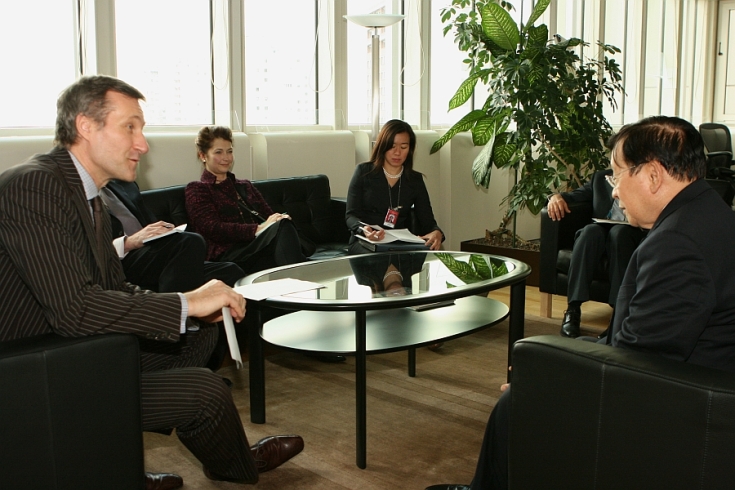The Inter-Parliamentary Union discusses ways to advance the CTBT
“The window of opportunity for multilateralism and the entry into force of the Treaty will not be open indefinitely,” Tibor Tóth, Executive Secretary of the Preparatory Commission for the Nuclear-Test-Ban Treaty Organization (CTBTO), told an international gathering of parliamentarians in Bangkok, Thailand, 28 March 2010. “Opportunities are seldom available indefinitely,” Tóth told t the 122nd Assembly of the Inter-Parliamentary Union (IPU). “We look to you to help us seize this moment in history” [ Tóth Statement
].
“The moment has come to aim for the early entry into force of the Comprehensive Nuclear-Test-Ban Treaty (CTBT),” Philippine’s Ambassador Antonio Rodriguez said on behalf of Alberto Romulo, Secretary of Foreign Affairs of the Philippines, in a statement [ Romulo Statement
].

Alberto Romulo, Foreign Affairs Secretary of the Philippines (right), and Tibor Tóth, CTBTO Executive Secretary (left), meeting in Vienna on 3 March 2010.
“The moment has come to aim for the early entry into force of the CTBT.”
“World’s Parliamentary Conscience on Nuclear Non-Proliferation and Disarmament”
The IPU was established in 1889 as the first permanent forum for multilateral political negotiations. Today, it is the focal point for world-wide parliamentary dialogue, striving towards peace and co-operation among peoples, and working for the firm establishment of representative democracy. National parliaments of 143 countries are members of the IPU and the organization has permanent observer status at the United Nations. “The IPU is well placed to serve as the world’s parliamentary conscience on nuclear non-proliferation and disarmament,” said Harry Jenkins, the Speaker of the Parliament of Australia [Jenkins Statement].

The Inter-Parliamentary Union is holding its 122nd Assembly in Bangkok, Thailand, 27 March - 1 April 2010.
The IPU’s clear position in support of the CTBT
More than a decade ago, the IPU adopted its first resolution encouraging all countries to sign and ratify the CTBT. At its April 2009, assembly in Addis Ababa, the IPU adopted a resolution recognizing the CTBT as one of the essential steps towards a world free of nuclear weapons and urged States, particularly those whose ratification is required for the Treaty’s entry into force, to sign and ratify the CTBT. “I urge all of you here to add to the political momentum and a renewed spirit of openness and willingness to bring us closer to our goal of achieving a safer world,” Romulo said in his statement. “Whatever steps we can take at this very important time to provide impetus to the CTBT will affirm our commitment to the pursuit of a nuclear weapons free world.”
Alberto Romulo, Foreign Affairs Secretary of the Philippines.
“The CTBT is certainly one of the most effective measures that the international community can take to promote world peace and security.”
The CTBT – An effective measure to promote peace and security
“The CTBT is certainly one of the most effective measures that the international community can take to promote world peace and security,” said Tóth said. The Treaty is a catalyst for disarmament, a strong instrument for non-proliferation, and one of the measures around which international consensus can be built, he said.
“With the CTBT in force, a country with nuclear ambitions will be constrained to develop them while countries with arsenals will be constrained from improving them,” Romulo’s statement added. “Banning the testing of nuclear weapons […] is integral to building the confidence necessary to secure a world without nuclear weapons,” Jenkins said.
“With the CTBT in force, a country with nuclear ambitions will be constrained to develop them while countries with arsenals will be constrained from improving them,” Romulo’s statement added. “Banning the testing of nuclear weapons […] is integral to building the confidence necessary to secure a world without nuclear weapons,” Jenkins said.

Harry Jenkins, Speaker of Australia's House of Representatives.
“I urge each of you to consider how as parliamentarians you can contribute to advancing global nuclear non-proliferation and disarmament.”
IPU Parliamentarians Have Crucial Role
Tóth noted that the members of the IPU can lead the way towards the Treaty’s entry into force. “The time has come for your swift action to fulfill the aspirations of a world that is desperate to be saved from its own folly,” he said.
“I urge each of you to consider how as parliamentarians you can contribute to advancing global nuclear non-proliferation and disarmament,” Jenkins told the meeting after outlining a number of possible activities parliamentarians could pursue to support the CTBT and other non-proliferation and disarmament measures. “The world’s parliamentarians have a crucial role to play to ensure humankind’s survival and that nuclear weapons and other weapons of mass destruction would one day be consigned to history as a dark era in our collective past,” Romulo’s statement declared.
“I urge each of you to consider how as parliamentarians you can contribute to advancing global nuclear non-proliferation and disarmament,” Jenkins told the meeting after outlining a number of possible activities parliamentarians could pursue to support the CTBT and other non-proliferation and disarmament measures. “The world’s parliamentarians have a crucial role to play to ensure humankind’s survival and that nuclear weapons and other weapons of mass destruction would one day be consigned to history as a dark era in our collective past,” Romulo’s statement declared.

Tibor Tóth and Harry Jenkins (IPU Image).
The Treaty is “within political reach”
Under the CTBT, all nuclear explosions are banned. The Treaty has been ratified by 151 States and signed by 182. China, the Democratic People’s Republic of Korea, Egypt, India, Indonesia, Iran, Israel, Pakistan and the United States still have to ratify for the Treaty to enter into force. Another 35 States have either not signed (10 States) or not ratified (25 States) the Treaty. “Today, [the Treaty] is within political reach. But we need determined action by the international community to go the very last mile,” Tóth said.
